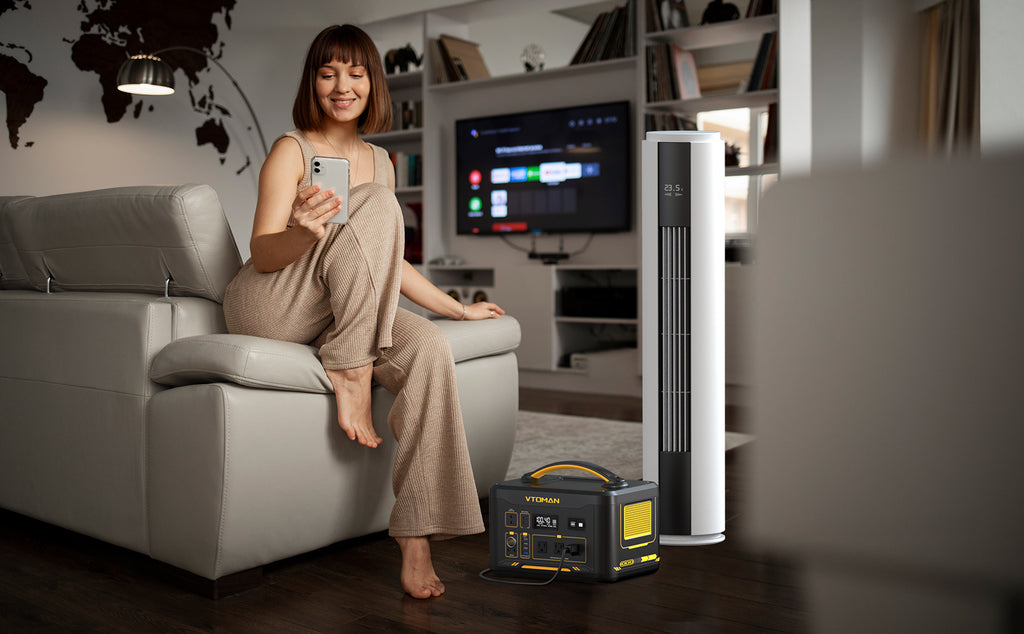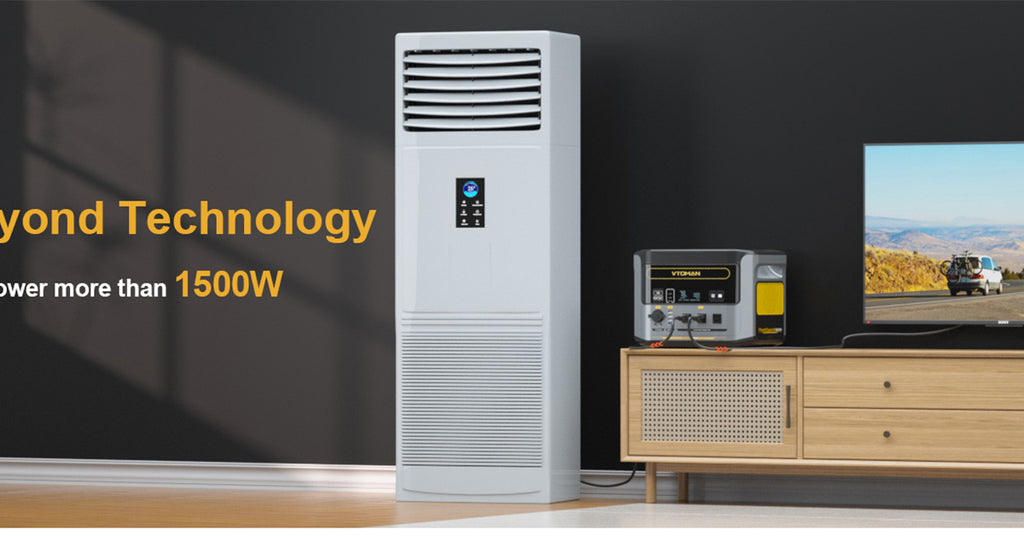Quick Answer: For central air conditioning, you typically need a large 5000–8000-watt portable generator or higher, depending on the cooling tonnage. A 2000–3000-watt portable generator can handle most window air conditioners except for larger 12000 BTU units. Portable ACs require 1000-1800 watts, so a 2000–3000-watt portable generator will work for them. Always check the exact wattage requirements of your specific AC unit. Choose a portable generator sized 20% above the running watts to allow for starting surge needs.
In this blog post, we’ll provide details on determining the ideal generator for your central air, window unit, or portable AC.

How Do We Calculate the Capacity of the Required Generator?
To determine the size generator you need, you should evaluate your air conditioner's power requirements, including running and starting power, and any other equipment you wish to power simultaneously.
Identify Your AC's Power Requirements
Check the manufacturer's label or manual for the starting and running wattage.
Consider Additional Appliances
List other essential devices you wish to power during an outage (e.g., refrigerator, lights, sump pump).
Calculate Total Wattage
- Add the running watts of all appliances.
- Determine the highest starting wattage among them.
- Sum the running and starting wattages.
Add a Safety Margin
For example, if your AC requires 4,000 running watts and 12,250 starting watts, and you have additional appliances totaling 1,000 running watts and 3,000 starting watts, the total wattage needed would be:
- Running Watts: 4,000 + 1,000 = 5,000 watts
- Starting Watts: 12,250 + 3,000 = 15,250 watts
- Total Wattage: 5,000 + 15,250 = 20,250 watts
- With a 25% safety margin: 20,250 × 1.25 = 25,312.5 watts
Therefore, a generator rated at least 25,500 watts would be advisable.
What Are the Characteristics of Different Types of Generators?
- Portable Generators: These are great if you only need to power a few appliances temporarily. You can move them easily to different locations, making them perfect for camping or short-term backup.
- Standby Generators: Installed permanently outside your home, they turn on automatically when the power goes out. They can power most or all of your home’s appliances without you lifting a finger.
- Inverter Generators: These provide clean, stable electricity that’s safe for sensitive devices like laptops or TVs. They run quietly and use less fuel, though they usually produce less power than other types.
How Big of a Generator for Central Air Conditioners?
Central air conditioning systems place the highest electrical demands for cooling your home. These permanently installed split systems consist of an outdoor compressor and evaporator coil paired with indoor air handlers. The tonnage denotes the cooling capacity, with one ton equaling 12,000 BTUs. What size portable generator do you need for central air? Here are the detailed wattage recommendations:
- 1-ton (12,000 BTU) central AC: 2,000-3,000 watts. A 3,000-watt generator is recommended.
- 5-ton (18,000 BTU) central AC: 2,500-4,000 watts. A 4,000-watt generator is recommended.
- 2-ton (24,000 BTU) central AC: 4,000-6,000 watts. A 5,000-watt generator is ideal.
- 5-ton (30,000 BTU) central AC: 5,000-7,000 watts. A 6,500-watt generator is recommended.
- 3-ton (36,000 BTU) central AC: 6,500-8,500 watts. A 7500-watt generator is ideal.
- 4-ton (48,000 BTU) central AC: 8,000-10,500 watts. A 10,000-watt portable is recommended.
- 5-ton (60,000 BTU) central AC: 9,500-12,000 watts. Opt for a 12,000-watt portable generator.
Always reference your owner’s manual for the exact wattage ratings. Other factors like SEER efficiency, motor types, and fan speeds influence power draw. Central air conditioning start-up requires a momentary surge of 3-5 times the running watts. So, a 10,000-watt portable generator can struggle to start a large central AC despite having sufficient power once running. Consider a 15,000+ watt surge-rated portable to be safe.
Choose generators with inverter technology for stable, clean electricity. Voltage spikes can damage the control boards in air conditioning compressors. Maintain your generator properly with scheduled maintenance. Starting your central AC before the generator is fully powered on can overload the engine. Position the portable unit near your home’s electrical panel to minimize voltage drop.
What Size of a Portable Generator for Window Air Conditioners ?
Window air conditioners are a common way to cool a room. Mounted in a window opening, these self-contained units pull in outdoor air to evaporate refrigerant and cool your space. The British Thermal Unit (BTU) rating denotes the cooling power. Do you need a special generator for a window AC? Here are the typical portable generator wattages needed:
- 5,000 BTU window AC –900 watts. A 2000-watt portable generator is sufficient.
- 6,000 BTU window AC –1,100 watts. A 2000-watt portable generator is sufficient.
- 8,000 BTU window AC –1,200-1,500 watts. Use a 3000-watt portable generator.
- 10,000 BTU window AC –1,400-1,800 watts. A 3000-watt portable generator works well.
- 12,000 BTU window AC –1,600-2,000 watts. Use a 3000-4500 watt portable generator.
- 15,000 BTU window AC –1,800-2,500 watts. Use a 4500-watt portable generator.
- 18,000 BTU window AC –2,200-3,000 watts. Use a 5000-watt portable generator.
- 24,000 BTU window AC –2,800-3,500 watts. A 6500-watt portable generator is recommended.
Always consult the user manual for your window AC unit’s specific power requirements. Aim for a solar generator wattage capacity 20% above the listed running watts for optimal performance. Extension cord sizes and lengths impact voltage delivery, so position your generator close to the window AC and use heavy-duty cords. Turn off other appliances when starting the window AC to ease the initial starting load.
How Large of a Generator for Air Conditioners ?
Need to cool just a single room? Portable air conditioners are easy to move and require less electricity than window units. Set them up, extend the exhaust hose vent, and they don’t even need a window. Choosing the right generator for a portable AC depends on the BTU rating:
- 7,000 BTU portable AC –800 watts. A 2000-watt generator provides ample power.
- 8,000 BTU portable AC –1,000 watts. A 2000-watt generator provides ample power.
- 10,000 BTU portable AC –1,200 watts. A 2000-watt generator provides ample power.
- 12,000 BTU portable AC –1,500 watts. Choose a 3000-watt portable generator.
- 14,000 BTU portable AC –1,800 watts. Select a 3000-3500-watt portable generator.
- 16,000 BTU portable AC –2,000 watts. Use a 4000-watt portable generator.
Check your owner's manual for the surge watts needed at start-up. Voltage drops can hinder performance, so use heavy-duty extension cords and keep the lengths short. Position the portable generator near the portable AC unit. Proper generator maintenance prevents power quality issues. With the right-sized generator, you can beat the heat anywhere power outages occur.

What Other Factors Should Be Considered When Choosing a Generator?
- Fuel Type: Choose a fuel type that’s easy for you to get and store, like gasoline, diesel, propane, or natural gas. Different fuels affect running costs and maintenance.
- Noise Level: If you want a quieter generator, especially in residential areas, consider inverter models. They run more quietly and won’t disturb your neighbors.
- Portability: Portable generators are flexible and easy to move, but can be heavy and need manual setup. Make sure you’re comfortable handling it.
- Safety Features: Look for overload protection and carbon monoxide detectors to keep you safe. These features prevent damage and harmful gas buildup.
- Budget: Pick a generator that fits your budget but still meets your power needs. Sometimes paying more up front saves you trouble later.
Stay Cool in a Power Outage
Don't let a power outage leave you sweating this summer. Determine the wattage needs of your specific air conditioning unit and choose an appropriately sized portable generator. With central air, window units, and portable ACs, the generator must provide steady, clean electricity free of voltage drops. Position generators close, use heavy-duty cords to minimize losses and take care of maintenance. Follow these guidelines so you can run your AC efficiently with a portable generator when the electricity goes out.












